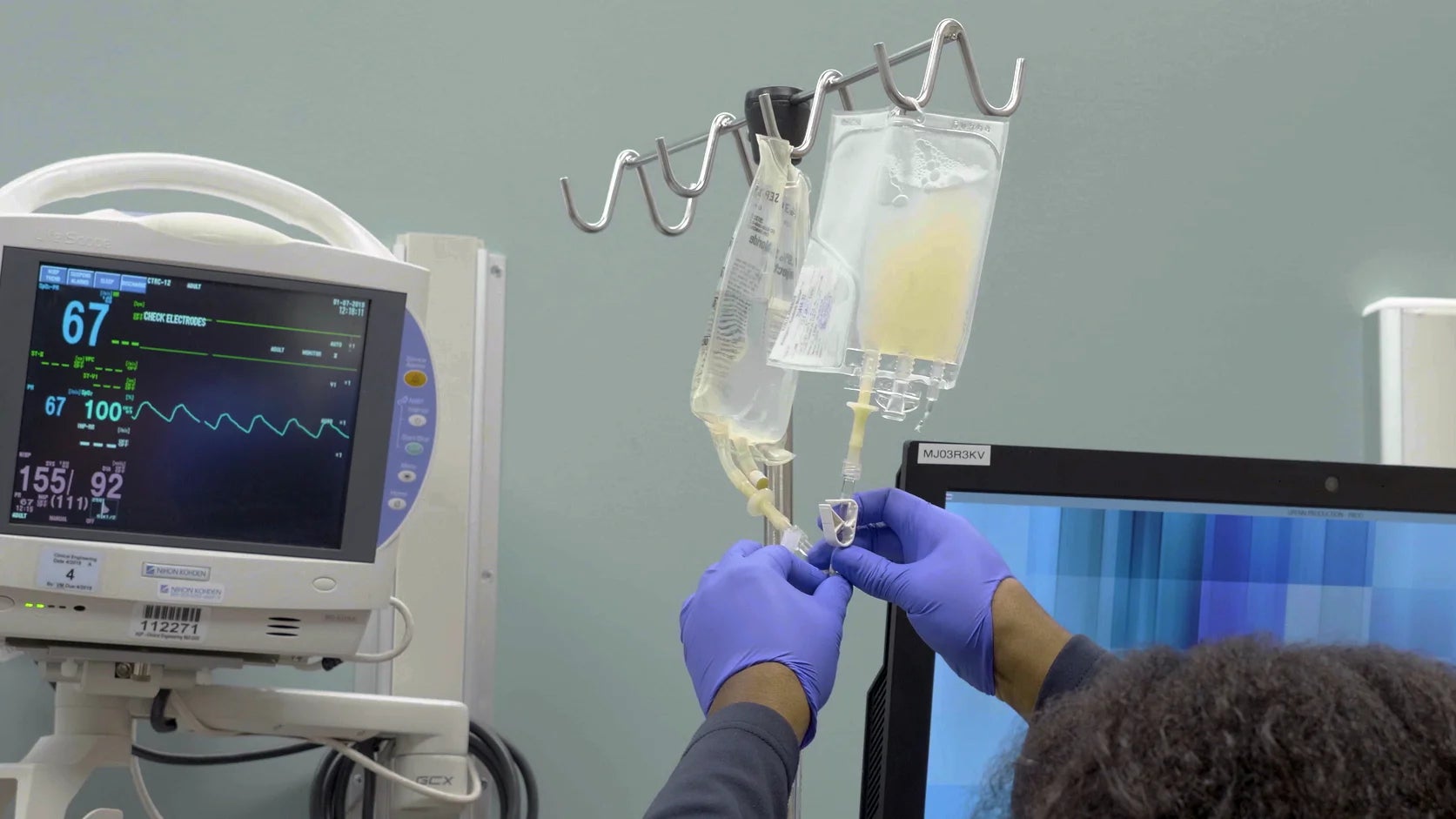Delaware
Federal funding cuts threaten vital HIV prevention programs in Delaware

Delaware effectively helped more than 800 people in 2020. Fast forward to 2022, with the CDC funding, that number was around 2,200 cases. Case work included connecting individuals, particularly those newly diagnosed with HIV, AIDs, or other sexually transmitted diseases, to essential services to ensure they receive the necessary referrals, care, and treatment for their diagnoses.
“What this funding did, it allowed us to clear through a backlog of cases that were prior to COVID in 2020,” she said, but it all was possible due to new hires. “Our disease intervention specialists workforce at the time was probably less than five people.”
That backlog due to understaffing was addressed with CDC assistance, leading to the formation of a statewide workforce team of 20.
The Department of Public Health remains committed to providing prevention programs. They say they’re prepared to collaborate with other partners and pursue additional grants to ensure continuity. Walker confirms that HIV programs will continue, even if the DPH has to take the lead and handle the work themselves.
“We look to funding grants and other funding opportunities that are open to many jurisdictions across the country,” she said. “As a result of being told about these funding cuts, what we have been able to do is identify some resources in-house, we’ve doubled up some places where we were able to, we’ve reached out to other external partners to say, ‘Hey, would you be willing to take on some of this work and assist,’ and then we’ve also moved some services in-house.”
“There is still going to be HIV counseling and referral and the condom distribution program, some of the PrEP services, as well as the cluster investigations and everything else,” she said.
The state will also be able to maintain its workforce with new hires.
“We recently found out in the last couple months that we are going to be able to continue that team with that number so that we are not going to lose that workforce in Delaware and that warm handoff and that client contact will still occur,” Walker said. “So they’ll still be able to provide the counseling and the referral and be able to connect them to some of the other resources and services in the community.”
However, the greater impact falls on external community-based organizations.
“The only two contracts that we had to eliminate [were] two contracts we had with the Latin American community centers and a contract that we also had with Brandywine Counseling Community Center, and that was just for testing, HIV testing,” Walker said.
Even with some contracts still in place, substantial funding impacts are evident, raising concerns about potential disruptions in condom distribution and the potential layoff of two disease intervention specialists at the Delaware HIV Consortium.
“Just because funding is going away doesn’t mean that the need isn’t going to be there,” said Tyler Berl, the executive director of the Delaware HIV Consortium. “We’re still trying to understand the impact for our organization specifically and system-wide.”
He emphasizes the limited number of providers offering HIV risk reduction services in Delaware. He said whether organizations receive minimal or substantial funding, it will pose challenges for both community members and the organizations themselves.
“The cuts that we’ll receive this year from the amount that we had last year is about a little over 90% of reduction in funding from my HIV prevention contract previously. That’s gonna have a huge impact. It employs a couple staff members,” Berl said. “It’s our sense right now that if no funding is found then we’ll have to lay off, unfortunately, two of our key players who provide HIV prevention services in the community.”
The consortium is expecting to lay off those two employees and discontinue its “Mail Order Condom” program. According to statistics from the Delaware HIV Consortium, this decision means that 500 Delawareans, with 20% of that group being HIV positive, will no longer have access to safe sex supplies in the future.

Delaware
These new health care laws are coming to Pa., N.J. and Del. in 2025

Abortion insurance coverage
A new law requires most private health insurance plans, state-regulated plans and Delaware’s Medicaid insurance program to cover abortions and related health care.
Health insurers are required to cover up to $750 for abortion services, which state lawmakers said should fully cover the cost of care for most patients.
There is an exemption for churches, religious businesses and employers to seek a waiver from the new requirements.
Insurance coverage for abortion begins Jan. 1 for people enrolled in Medicaid. Coverage for people with other types of health insurance plans will begin the following year, on Jan. 1, 2026.
New Jersey
Medical debt consumer protections
Parts of the Louisa Carman Medical Debt Relief Act already took effect this past summer, and more consumer protections are scheduled to kick in this coming July.
Right now, people in New Jersey who have unpaid bills and debt from hospital stays, health procedures and other kinds of care will not see their credit scores impacted as they figure out how to pay off their debt or dispute charges.
“Medical debt is incurred involuntarily, and it can result in exponential economic harms,” said Laura Waddell, health care program director at New Jersey Citizen Action. “So it wasn’t like, ‘Should we work on this?’ It was, ‘We have to work on this.’”
Debt collectors can no longer report a person’s medical debt to credit bureaus and agencies, which determine a person’s credit score. If someone’s score drops because of their medical debt, they may find it more difficult to secure a car loan, get approved for an apartment rental, apply for credit cards and even get a job.
If a bill collector does report a person’s medical debt to a credit bureau or agency in violation of the new state law, the amount of debt that is reported is voided, meaning, the patient will no longer have to pay it.
Beginning this July, all notices to patients about medical debt and billing must also notify them of their rights and new consumer protections. Interest on medical debt will be capped at 3% and debt collectors will be banned from using wage garnishment — when a portion of a person’s paycheck is withheld to pay off debt — for people earning up to 600% of the Federal Poverty Level, which is about $90,360 a year for a single person, or $187,200 for a family of four.
Waddell said the new consumer protections may not apply to people who are using medical credit cards to pay for services, copays and other charges (these are different from debit cards used for Health Savings Accounts).
Efforts to reduce the burdens of medical debt and regulate collection practices even more is ongoing, Waddell said.
“In the coming year, we want to try to bring more protections so that these aggressive debt collection practices, really try and curb some of those,” she said.
Postpartum health care planning
Later this spring, health care providers will be required to make a care plan with pregnant patients and new mothers for the postpartum period, which is a time after when women can experience complications after labor and delivery.
These postpartum care plans must include the review of future health care appointments; recommended testing or procedures for any ongoing health issues; guidance on the signs and symptoms of postpartum depression, anxiety and other mental health needs; breastfeeding support services; contraception options; and recommendations for other common postpartum health issues.
Plans and guidance must also be offered to patients who’ve experienced stillbirth and pregnancy loss.
Delaware
Delmarva Power redesigns its bills | Delaware LIVE News


Delmarva Power has reformatted its bills to make them easier to understand.
The new design started in November for all of the utility’s hundreds of thousands of residential and commercial customers in Delaware.
Zach Chizar, a senior communications specialist, said the redesign is based on feedback from customer focus groups. “It’s all about how to understand the bill better, in a visual approach,” he said.
The most dramatic addition, at the top right of the first page, is a colorful ring-shaped chart that splits the bill into delivery, electric supply, and (if used) gas supply.
Delmarva, a subsidiary of Chicago-based Exelon, the nation’s largest utility company, is only in the delivery business and does not generate power, he noted.
Some text on the top left of the first page adds a new breakdown of the monthly charges: total delivery, electric delivery, gas delivery, electric supply, and gas supply. By contrast, the old bill only listed electric and gas charges.
The amount due, below these breakdowns, is in more prominent type.


The new bill drops the bar charts covering daily electricity and gas usage. It refers customers to the utility’s website, where they can already see usage broken down by the hour for their account.
The sample bill that Delmarva posts on its website runs four pages, down from a typical five for an electric and gas customer.
In another customer-friendly move, Delmarva recently opened its call centers on Saturday mornings to handle the number of calls it gets. “No one enjoys being on hold,” Chizar said.
(A helpful landing page titled “Understanding my bill” might answer questions.)
The new design generated some grumbling on social media. “They always just add extra charges and make it too confusing to figure out,” one post complained.
There are no new charges and no delivery rate increases involved now, Chizar said, noting that the cost of gas and electricity varies.
Delaware
Which Kent County restaurants had the most violations in the past 30 days?

Here’s how restaurant inspections work
Restaurants in Delaware are inspected about every six months, according to the Office of Food Protection. Here’s what inspectors look for.
Jenna Miller, Jenna Miller
Is your favorite Kent County restaurant or food establishment among the places with the most health and food safety guideline violations in the past 30 days as of Dec. 15?
See the chart below to find out. At the top of the chart is Bangkok Thai Cuisine with 12 violations on Nov. 26.
Or see how well food establishments in all three Delaware counties are complying with regulations by searching Delaware Online/The News Journal’s restaurant inspection database.
Restaurants, food trucks, church kitchens, grocery stores, delis, concession stands, ice cream parlors, pizzerias, schools, hospitals, bakeries, fitness centers, hotels, and golf clubs are among the more than 3,500 permitted Delaware food establishments that prepare and serve food to the public and are included in the database.
The database is updated using information from the Delaware Department of Health and Social Services. Most places are inspected twice per year, using the State of Delaware Food Code, a science-based regulation similar to the national model from the U.S. Food and Drug Administration.
The database is meant to be a tool for consumers to be informed, however, it is only one measurement of a food establishment’s operations and does not provide a full picture of any business’s overall standards or offerings.
If you have questions regarding a food inspection report, whether currently reported or for a prior reporting period, please contact the Office of Food Protection at 302-744-4546.
🔗 Bookmark data.delawareonline.com/restaurant-inspections to always find the latest reports.
Previous Delaware food establishment inspection reports
Which food establishments had the most violations during previous 30-day periods? Click on the links below to find out.
New Castle County for periods ending: Dec. 1, 2024 ∎ Oct. 27, 2024 ∎ July 29, 2024 ∎ June 30, 2024 ∎ April 20, 2024 ∎ March 2, 2024 ∎ Feb. 3, 2024 ∎ Jan. 6, 2024
Kent County for periods ending: Nov. 17, 2024 ∎ Sept. 9, 2024 ∎ July 27, 2024 ∎ June 28, 2024 ∎ March 9, 2024 ∎ Feb. 10, 2024 ∎ Jan. 13, 2024 ∎ Dec. 9, 2023
Sussex County for periods ending: Nov. 24, 2024 ∎ Oct. 7, 2024 ∎ July 28, 2024 June 29, 2024 ∎ April 13, 2024 ∎ Feb. 17, 2024 ∎ Jan. 21, 2024 ∎ Dec. 16, 2023
Latest Kent County food establishment inspections
NOTE: The chart below may take a minute to load. If you are having trouble viewing it, you may also see it here.
-

 Technology1 week ago
Technology1 week agoStruggling to hear TV dialogue? Try these simple fixes
-

 Business7 days ago
Business7 days agoOpenAI's controversial Sora is finally launching today. Will it truly disrupt Hollywood?
-

 Politics3 days ago
Politics3 days agoCanadian premier threatens to cut off energy imports to US if Trump imposes tariff on country
-
/cdn.vox-cdn.com/uploads/chorus_asset/file/25782636/247422_ChatGPT_anniversary_CVirginia.jpg)
/cdn.vox-cdn.com/uploads/chorus_asset/file/25782636/247422_ChatGPT_anniversary_CVirginia.jpg) Technology4 days ago
Technology4 days agoInside the launch — and future — of ChatGPT
-
/cdn.vox-cdn.com/uploads/chorus_asset/file/25789444/1258459915.jpg)
/cdn.vox-cdn.com/uploads/chorus_asset/file/25789444/1258459915.jpg) Technology2 days ago
Technology2 days agoOpenAI cofounder Ilya Sutskever says the way AI is built is about to change
-

 Politics2 days ago
Politics2 days agoU.S. Supreme Court will decide if oil industry may sue to block California's zero-emissions goal
-
/cdn.vox-cdn.com/uploads/chorus_asset/file/25546252/STK169_Mark_Zuckerburg_CVIRGINIA_D.jpg)
/cdn.vox-cdn.com/uploads/chorus_asset/file/25546252/STK169_Mark_Zuckerburg_CVIRGINIA_D.jpg) Technology3 days ago
Technology3 days agoMeta asks the US government to block OpenAI’s switch to a for-profit
-

 Politics4 days ago
Politics4 days agoConservative group debuts major ad buy in key senators' states as 'soft appeal' for Hegseth, Gabbard, Patel



















